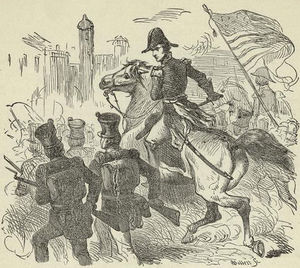Battle of Pensacola (1814)
- This article is about the 1814 conflict. For the 1781 invasion that ended British rule, see Siege of Pensacola.
The Battle of Pensacola was a military engagement on the War of 1812 that took place on November 7, 1814, when American forces under General Andrew Jackson captured Pensacola, then the capital of Spanish West Florida, to rid the area of British influence.
Knowing that British forces were using Spanish West Florida as a staging ground for their attacks, Jackson established a force at Mobile in August 1814 in preparation to march on Pensacola. They arrived at the city on November 6 and initiated communication with the Spanish governor, Mateo Gonzáles Manrique. The first messenger Jackson sent, Major Henri Peire, was fired upon by the garrison at Fort San Miguel despite Peire's white flag of truce. Next Jackson sent a Spanish prisoner to the fort bearing the same demand to surrender, insisting he was not making war on Spain, but Manrique refused. As Jackson's forces advanced upon the city the next morning, Manrique surrendered within minutes — though the commanders stalled for several hours in vain hope of British reinforcement. Before Jackson could move on the remaining British forces at Fort San Carlos de Barrancas, they organized a hasty retreat on November 8, blowing up the harbor defenses as they evacuated.
Jackson's actions at Pensacola were precarious for American diplomacy, and Secretary of State James Monroe wrote with instructions to "withdraw your troops from the Spanish Territory, declaring that you had entered it for the sole purpose of freeing it from the British violation."[1] Even before receiving this correspondence, Jackson had returned the city to Manrique's control on November 9, saying that the "enemy having disappeared and the hostile creeks fled to the Forest, I retire from your Town, and leave you again at liberty to occupy your Fort."[2]
Jackson returned to Mobile on November 19, and thence to New Orleans.
